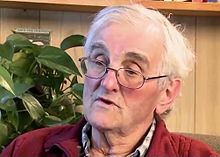David Keith Orton | |
|---|---|
 Orton in 2011 | |
| Born | January 6, 1934 Portsmouth, England |
| Died | May 12, 2011 (aged 77) |
| Nationality | Canadian |
| Era | 20th Century |
| Region | Western philosophy |
| School | Deep ecology, left biocentrism |
Main interests | Environmental ethics |
David Keith Orton (January 6, 1934 – May 12, 2011) was a Canadian writer, thinker and environmental activist who played a leading role in developing "left biocentrism" within the philosophy of deep ecology.[1] Orton and his collaborators added the word "left" to biocentrism to indicate their anti-industrial, anti-capitalist orientation and their concern for social justice. Their 10-point Left Biocentrism Primer, published in 1998, accepts the idea that the natural world belongs to all living things, but it also calls for the ethical principles of deep ecology to be applied to sensitive political issues such as working for a reduction in the human population, achieving justice for aboriginal peoples, struggling for workers' rights and redistributing wealth.[2] Orton, however, frequently asserted that the rights of nature had to come first. "Social justice is only possible in a context of ecological justice," he wrote. "We have to move from a shallow, human-centered ecology to a deeper all-species centered ecology."[3] Elsewhere he added: "There is no justice for people on a dead planet."[4]
In his extensive writings for a variety of magazines, journals, websites and his own "Green Web", Orton warned about what he saw as the disastrous effects of basing a society's economy on mass consumption, profit and the exploitation of people and other living beings.[5] "An industrial capitalist society, that does not recognize ecological limits but only perpetual economic expansion and has the profit motive as driver, will eventually consume and destroy itself," he wrote in an online commentary. "But we will all be taken down with it."[6] Orton argued that industrialism, not capitalism, was at the root of ecological destruction. "Industrialism can have a capitalist or a socialist face," he said.[4]
Left biocentrism affirms what one writer calls "a 'collective spirituality' based on the ultimate value of the Earth and its life-forms."[7] Orton himself said that left biocentrism views all living things and the Earth itself as sharing a community. "With such a community," he wrote, "there is a sense of Earth spirituality, as in past animistic indigenous societies, where it acted as a restraint upon human exploitation of nature."[4] Thinkers who influenced Orton and his left-biocentric colleagues included Arne Næss, Richard Sylvan, Rudolph Bahro,[8] and John Livingston.[9]
David Orton practised the voluntary simplicity that is a central tenet of left biocentrism. For 27 years, he lived with his wife and frequent co-author Helga Hoffmann-Orton in a small, 100-year-old farmhouse in Pictou County, Nova Scotia. They grew much of their own food and watched as their 130-acre property gradually reverted to forest habitat for a variety of plants, animals and birds.[6] Orton died of pancreatic cancer in 2011 at age 77.[10] At his own request, he was given a "deep green" burial in the forest near his home.[11]
- ^ "Dandelion Times: A Left Biocentric Journal". Retrieved May 16, 2011.
- ^ "Left Biocentrism Primer". Retrieved May 16, 2011.
- ^ a b c "A short talk on left biocentrism by David Orton" (PDF). Green Web. Retrieved June 5, 2011.
- ^ "Green Web". Retrieved May 21, 2011.
- ^ a b "How we live by David Orton". International Society for Environmental Ethics. Archived from the original on July 28, 2011. Retrieved May 16, 2011.
- ^ Curry, Patrick. (2006) Ecological Ethics: An Introduction. Cambridge: Polity Press, pp.85-86.
- ^ Curry, p.84.
- ^ "John Livingston: An Appreciation by David Orton" (PDF). Green Web. Retrieved June 6, 2011.
- ^ "Noted environmental activist David Orton dies at 77". The Coast. Retrieved May 17, 2011.
- ^ "A deep green burial by Helga Hoffmann-Orton" (PDF). Green Web. Retrieved June 5, 2011.